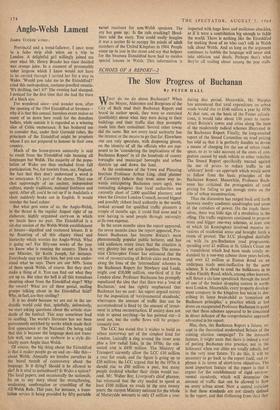Anglo-Welsh Lament
JAMES TUCKER writes: Provincial and a trend-follower, I once went to a Soho strip club when on a trip to London. A delightful girl willingly joined me over what Mr. Henry Brooke has since decided was orange juice. In a moment of presumably sober largesse which I knew would not have to be carried through I invited her for a stay in Wales. 'Would you take me to the Eisteddfod?' cried this metropolitan, costume-jewelled sweetie. `It's thrilling, isn't it?' The evening had slumped. I noticed for the first time that she had the trace of a black eye.
I've wondered since—and wonder now, after the opening of the 1964 Eisteddfod at Swansea— why it is that this annual, harmless event makes so many of us down here reach for the dumdum bullets, while outside it is regarded as a winning slice of Celtic exuberance. It has bothered me to consider that, under their Gorsedd robes, the principals of the Eisteddfod might be prophets whom I am not prepared to honour in their own country.
Much of the home-grown animosity is said to result from the Eisteddfod rule banning all languages but Welsh. The majority of the popu- lation of Wales are thus excluded from full participation. No, for tourists from, say, England, the fact that they don't understand a word is no annoyance. It's part of the charm. They can chat approvingly of an ancient, independent culture, sturdy traditions, national liveliness and spirit. After all, you'd be cut up if in Andalusia a choir suddenly broke out in English. It would smudge the looal colour.
But what gets some of us, the Anglo-Welsh, in the throat is the regular August sight of an elaborate, highly organised carry-on in which we locals have no part. The Eisteddfod is a six-day session of the Welsh-Welsh establishment at leisure—dignified and costumed leisure. It is the flaunting of all this cliquey ritual and hierarchy which worries the Anglo-Welsh. What is going on? For fifty-one weeks of the year we know who is running the country. There is our Minister, Sir Keith Joseph, for instance. Everybody may not like him, but you can under- stand what he says. There are our MPs. Some of them speak Welsh, of course. But they don't make a thing of it. You can find out what they are up to. But what the hell is all this tremulous shouting about from the Eisteddfod stage? Why the sword? What arc all these genial, smiling groups talking about in the Eisteddfod field? Why, in fact, are they smiling?
It is no doubt because we are out in the un- druidic world cold that, spitefully, defensively, we start asking questions about the artistic stan- dards of the festival. This may sometimes lead to scoffing. The world's literature has not been permanently enriched by works which made their first appearance at the National. On being told that this is because the language does not trans- late well, one raises an eyebrow in a style dis- tinctly more Anglo than Welsh.
Of course, the big thing about the Eisteddfod is that it makes people go on and on—like this— about Welsh. Annually we involve ourselves in the banal tumult of controversy about the language. Is it dying? Should it be allowed to die? Is it vital to nationhood? Is Wales a nation? The local papers, and occasionally the nationals, fix on to any story about the strengthening, weakening, confirmation or crumbling of the All-Welsh Rule. This year, for instance, a trans- lation service is being provided by fifty portable earset receivers for non-Welsh speakers. The cry has gone up: Is the rule cracking? Head- lines told the story. You could easily imagine it was a matter fit to occupy the minds of adult members of the United Kingdom in 1964. People come up to you in the street and say that helpers for the Swansea Eisteddfod have had to receive special lessons in Welsh. This information is imparted with huge leers and malicious chuckles, as if it were a contribution big enough to tickle the world. There is nothing like the Eisteddfod for making those of us who can't talk in Welsh talk about Welsh. And as long as the argument continues to bubble the language will never sink into oblivion and death. Perhaps that's what they're all smiling about among the pop stalls.






























 Previous page
Previous page